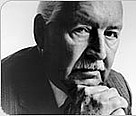Erich Brost – journalist and politician

Erich Brost – not only does this name stand for the founder of the largest regional newspaper in Germany, the Westdeutsche Allgemeine Zeitung (WAZ). Most of all, this name is directly linked to one of the most ambitious political goals in the postwar period: The reconciliation between Poland and Germany. Erich Brost felt strongly obliged to this desire his whole life, not only politically but also in his role as a journalist.
Erich Brost was born in Elbing in 1903. His father worked as a mechanic in a shipyard, his mother was a tailor. In 1915, the family moved to Danzig. The city became home for Brost throughout his life. It was here, where he grew up, where he went to school and finished his apprenticeship to become a bookseller. And it was also in Danzig, where Brost started with his political activities in the labour movement. Being a bibliophile, Brost discovered his passion for writing at a very early age and published his first article in the „Danziger Volksstimme“at the age of 19.
Decision for journalism
When in 1933 the Nazis infiltrated the parliament of Danzig, Erich Brost nevertheless continued fighting for his beliefs in two different ways: as a representative of the Social Democratic Party (SPD) in the Danzig People’s Assembly and by writing courageous editorial articles which even brought him into prison. In 1936, the newspaper „Danziger Volksstimme“ got suspended and the SPD forbidden. Brost went into exile – he stayed in Poland, Sweden, and Finland where he intensified his contacts to the SPD. In 1945, he finally moved back to Germany. He helped building up the „German News Service“, which became later the German Press Agency (dpa). Erich Brost also continued with his political work and later became a representative of the SPD party executive committee. He finally had to make a decision: Wanted he to be a politician or a journalist? In 1947, he was offered a newspaper licence. He accepted and on April 3rd, 1948 the first issue of the „Westdeutsche Allgemeine Zeitung“ (WAZ) was published. „I have always and foremost been a journalist“, publisher Brost would say years later.
Journalist with passion
Although Erich Brost was a party member of the Social Democrats, he wanted to keep his newspaper above party lines. His doctrine was „to publish a newspaper which is social and democratic, but non- partisan“, he once said in 1995. According to Brost the paper should be „interesting and lively and always readable“, only pure information would be too little. The strict separation of facts and opinion were axiomatic however. Brost fully adopted the dogmatic BBC model during his journalistic years in Great Britain.
Being a journalist was his great passion. Even at high age, Brost‘s daily routine would imply taking care of his publishing work. Erich Brost passed away in 1995, right before his 92nd birthday. He described himself as a simple man who never went to college. However, being a true European, Erich Brost could easily communicate in five or six European languages. His idea of a united and reconciled Europe keeps on living in the Erich Brost Foundation, which he founded in 1991. As a direct offspring, the Erich Brost Institute for Journalism in Europe was built in Dortmund some years later, associated to the Institute of Journalism at the University of Dortmund. The institute’s prime concern is to provide German journalists with an international perspective, to educate and train international journalists, and to pursue research projects focusing on issues of international journalism.
